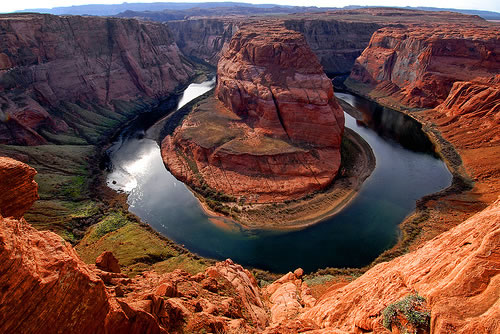California Water Wars Spotlight: Colorado River

California, Arizona and five other states get substantial amounts of water from the Colorado River, which is rightfully known as the most litigated river on the planet. The water is allocated by the 1922 Colorado River Compact, an agreement that most everyone agrees is outdated. Yet no one really wants to renegotiate it for fear they might end up with less water than they get now. Better the devil you know than the devil you don’t is the unspoken assumption.
You may be startled to learn that California gets more water from the Colorado than any other state, 4.4 million acre feet a year. Of that 3.8 goes to the Imperial Valley and three other irrigation districts for agriculture. Now, if you will, prepare yourself to enter the looking glass world of water rights.
The behemoth Metropolitan Water District of Southern California has a fourth and fifth priority right on some of that water. Those four irrigation districts have water rights that predate the Colorado River Compact. Thus, they receive allocations every year, drought or no drought, before anyone else. Other states, notably Arizona, hadn’t been using their full allocations in previous years, which made their water available to others. But that has changed. Colorado River states are increasingly using all their allotments. California had been using the excess but that supply is quickly vanishing.
In Utah, unused allocations aren’t an issue because the rule is “Use it or lose it.” You purchase water rights and if you don’t use all your water it can be taken from you. Until recently in Colorado, it was illegal to capture water running off your roof into a rain barrel because that water belonged to those with downstream water rights. These examples perhaps give a flavor to the mind-numbing complexity of water rights. These gets compounded exponentially when water is shared between seven states.
The compact is divided into two tiers, upper and lower. The Upper Division (Colorado, New Mexico, Utah, and Wyoming) must not deplete their flow below a specified amount during any ten year period. This is so the Lower Division (Nevada, Arizona, and California) will get a roughly equal share.
Unfortunately, increased demand for Colorado River water brought on by growing populations and a lengthy drought have greatly hurt the Colorado. Fish populations are imperiled. Wetlands are becoming arid. The river barely empties into the Sea of Cortez in Mexico. That once lush river delta has deteriorated severely. Mexico is also a partner in the compact and most certainly will need (and deserves) more water.
Seven states compete for Colorado River water. But that supply is no longer reliable, and is in fact dwindling. The Colorado River Compact is 90 years old and is akin to using house and buggy technology at a modern airport. It is outmoded and needs to be renegotiated.



